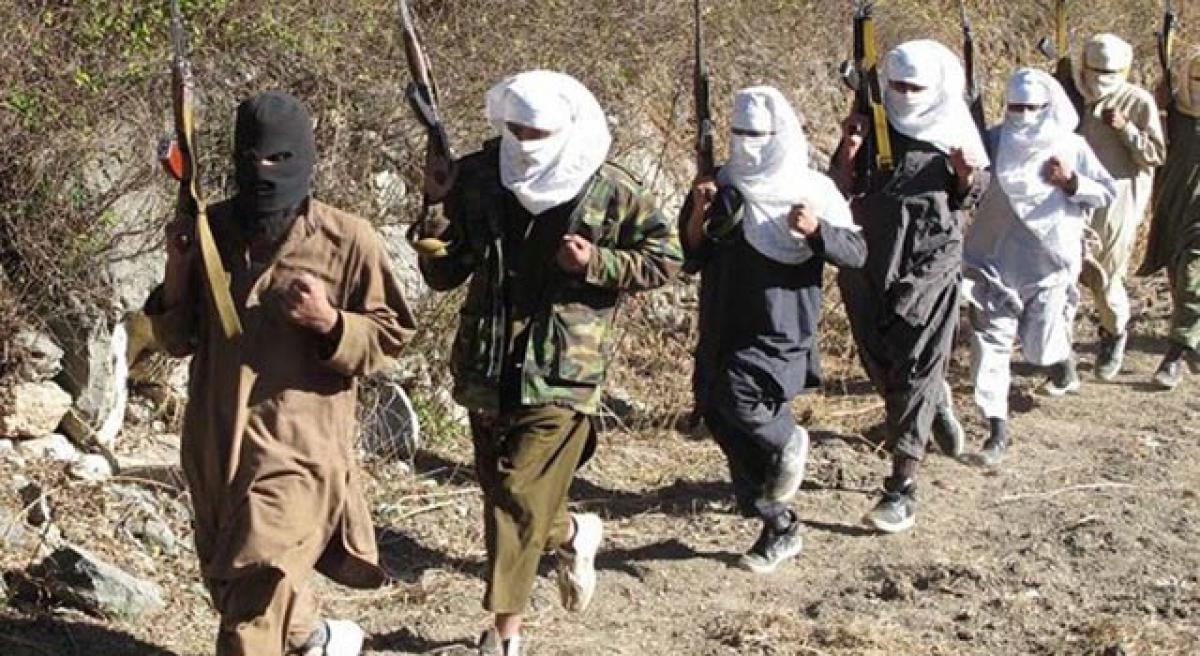Live
- Gurumurthy takes charge as chief of Gowda Corpn
- Study warns: Ultra-processed foods may accelerate biological age
- CM pledges more political opportunities to Madigas
- Year-Ender 2024 Guide: Home remedies to relieve Period Pain.
- All India crafts mela begins today
- TTD gears up for Vaikunta Ekadasi fete
- Vizag attracts tourists as much as Kashmir
- Express Yourself
- Rajadhiraaj: Love. Life. Leela
- Students immerse in nature in Chilkur forest
Just In

Eight days after the US military dropped its largest ever conventional bomb on suspected Islamic State fighters in eastern Afghanistan, Taliban militants breached an army base in the north of the country and killed scores of local soldiers. To Afghan and other critics of President Donald Trump\'s apparent indecision over how to win a seemingly intractable war, Friday\'s assault – the worse of its ki
Kabul: Eight days after the US military dropped its largest ever conventional bomb on suspected Islamic State fighters in eastern Afghanistan, Taliban militants breached an army base in the north of the country and killed scores of local soldiers. To Afghan and other critics of President Donald Trump's apparent indecision over how to win a seemingly intractable war, Friday's assault – the worse of its kind since the Taliban were ousted in 2001 – was evidence he was getting it wrong.
"The biggest threat to the security and stability of this country is the Taliban insurgents, not Daesh forces," said Mirwais Yasini, an influential Afghan member of parliament from Nangarhar province, using an Arabic term for Islamic State. "You drop your biggest bomb on Daesh, but what about the Taliban who kill dozens of our people every day?"
The American military command in Kabul did not respond to a request for comment, but in the wake of the base attack the top US commander in Afghanistan, General John Nicholson, promised to "continue to stand" with Afghan security forces. Nearly 9,000 US troops remain in Afghanistan, some 7,000 of them to train and assist local forces that Washington has spent billions of dollars to build virtually from scratch in the hope of one day handing over control completely.
While the advisers are seldom involved in direct combat with the Taliban or other militants, a smaller counter-terrorism unit of about 1,500 soldiers does engage insurgents, but its main targets are pockets of al Qaeda and Islamic State fighters. They are estimated to number in their hundreds, while the Taliban number thousands or tens of thousands and have gained swathes of territory in the last few years.
Islamic State has claimed several deadly bombings in Afghanistan and neighbouring Pakistan, but many experts believe the Taliban are the fundamental threat to the US-backed government of President Ashraf Ghani. In the final years of former US President Barack Obama's administration, American troops in Afghanistan were discouraged from directly targeting the Taliban, amid hopes the group could be brought to the negotiating table for peace talks.
Despite a surge of tens of thousands of US soldiers that ended in 2012, some Afghan officials became impatient with what they saw as an American fixation on withdrawal, and since then, a lack of focus on ending the war. In Kabul, some Afghan leaders are angry at what they see as a failure by the Americans to act as strongly as possible against the Taliban, as well as Pakistan, which they accuse of harbouring and supporting insurgents as a hedge against Indian influence in the region.
Pakistan denies this and instead says it is itself a victim of terrorism, including from groups operating from within Afghanistan. "The Taliban are the single biggest challenge in the country, but unfortunately since the regime's collapse, the United States and the Afghan government have not had a clear strategy to eliminate them or push them to negotiation," said Mohammad Farhad Sediqi, a member of parliament from Kabul.
"As you dropped the 'Mother of All Bombs' on Daesh, there should be one dropped on the Taliban sanctuaries and training grounds on the other side of the border in Pakistan." Analysts say the recent US-endorsed strategy of focusing on protecting major cities and other population centres in Afghanistan while consolidating forces will not be enough to bring the Taliban to the negotiating table.
Resurgent Taliban forces, meanwhile, control or contest 43 per cent of the country, a 15 percent increase over the year before. "In what universe does that not matter?" Koskinas said. "Territory means resources for them. You're giving away all the smuggling routes and opium and all the things that are enriching the Taliban and fueling the insurgency." Retaking territory lost to the Taliban will be key to turning the tide, Koskinas said. "At this point we almost don't need to talk about safe havens in Pakistan, because they have safe havens in Afghanistan."
By Josh Smith & Hamid Shalizi

© 2024 Hyderabad Media House Limited/The Hans India. All rights reserved. Powered by hocalwire.com







